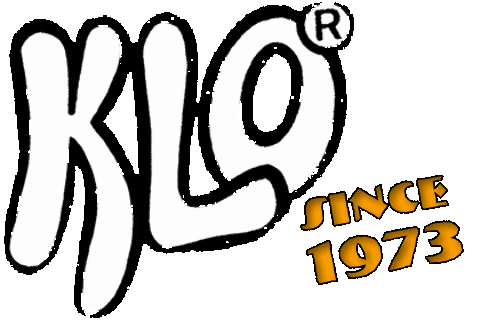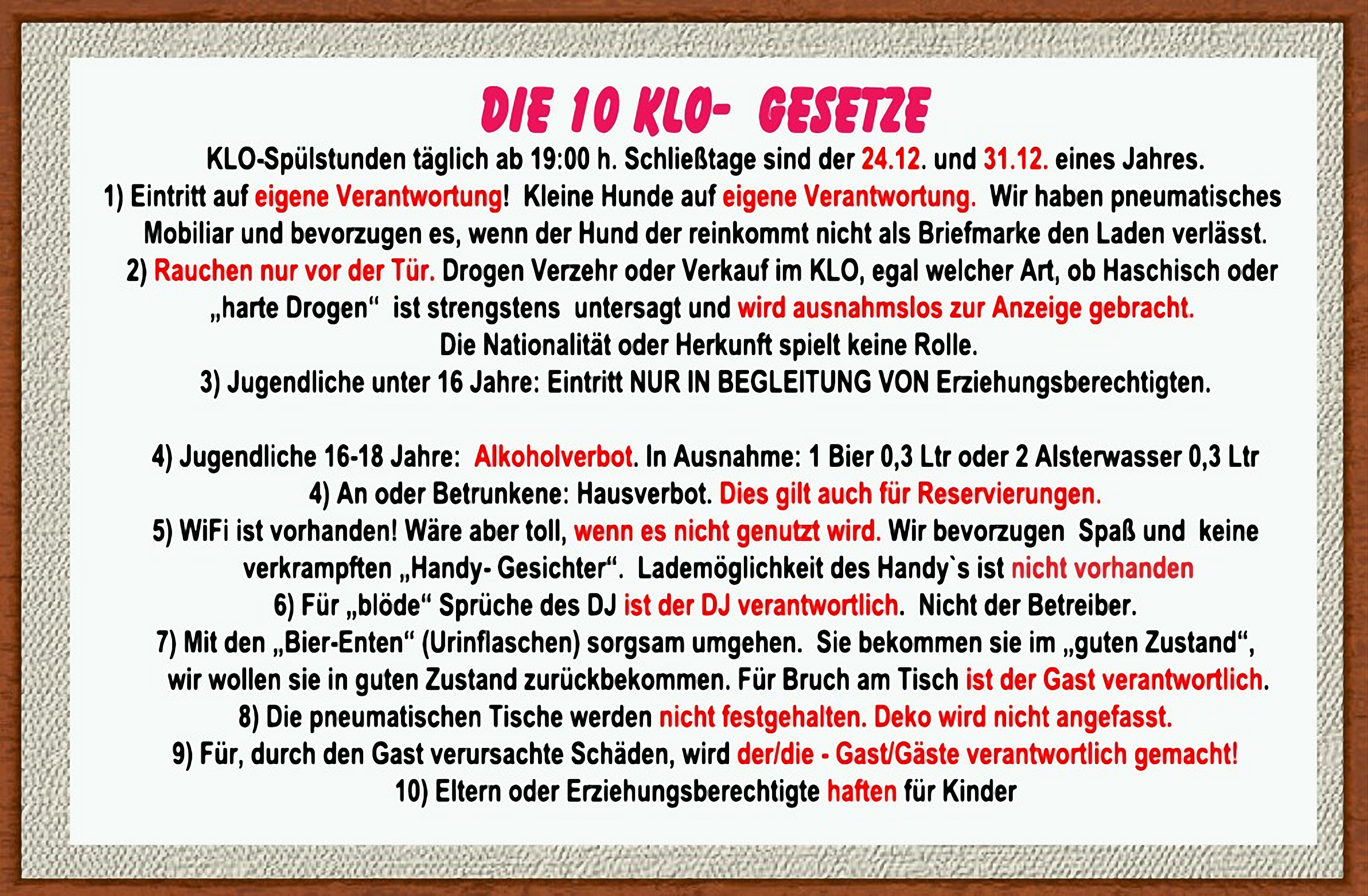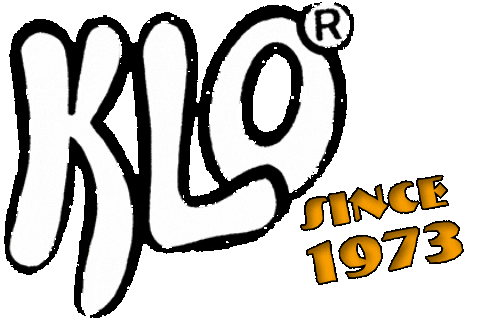Das Jugendschutzgesetz dient dem Schutz der Jugend in der Öffentlichkeit. Es regelt den Verkauf, die Abgabe und den Konsum von Tabak und Alkohol, die Abgabe, zum Beispiel Verkauf und Verleih, von Filmen und Computerspielen sowie den Aufenthalt in Gaststätten und bei Tanzveranstaltungen (zum Beispiel in Diskotheken).
Wesentliche Kernpunkte des Jugendschutzgesetzes sind:
- Alkohol, Tabak
In Gaststätten, Verkaufsstellen und allgemein in der Öffentlichkeit gilt:
Die Abgabe (Verkauf, Weitergabe) von Tabakwaren an Kinder und Jugendliche ist verboten. Auch der Konsum von Tabakwaren darf unter 18-Jährigen nicht gestattet werden. Zigarettenautomaten müssen technisch so ausgestattet sein, dass eine Entnahme von Zigaretten durch unter 18-Jährige nicht möglich ist. Die Abgabe von branntweinhaltigen Produkten (Spirituosen, auch: branntweinhaltige Mischgetränke) an Kinder und Jugendliche unter 18 Jahren ist verboten.
Willst Du es genau wissen? Klick auf die Karte hier rechts !
Auch deren Verzehr darf unter 18-Jährigen nicht erlaubt werden. Andere alkoholische Produkte (Bier, Wein, Sekt, auch: Mischgetränke) darf an Kinder und Jugendliche unter 16 Jahren nicht abgegeben werden beziehungsweise deren Verzehr durch unter 16-Jährige nicht gestattet werden.
Für Tabak- und Alkoholprodukte besteht in Kinos ein Werbeverbot vor 18 Uhr.
- Filme, Spielprogramme
Computerspiele und Bildschirmspielgeräte müssen wie Kino- und Videofilme mit einer Altersfreigabekennzeichnung versehen werden. Diese Bildträger dürfen in der Öffentlichkeit (zum Beispiel in Handel und Videotheken) nur an Kinder und Jugendliche abgegeben werden, die das gekennzeichnete Alter haben.
Die Bundesprüfstelle für jugendgefährdende Medien kann neben allen herkömmlichen auch alle neuen Medien – mit Ausnahme des Rundfunks – auf Antrag indizieren. Sie kann auch ohne Antrag auf Anregung bestimmter Stellen tätig werden, um zu gewährleisten, dass möglichst alle jugendgefährdenden Angebote in die Liste der Bundesprüfstelle aufgenommen werden.
Schwer jugendgefährdende Trägermedien (zum Beispiel Bücher, Videos, CD, CD-ROM, DVD), die zum Beispiel den Krieg verherrlichen, die Menschen in einer die Menschenwürde verletzenden Weise darstellen oder Jugendliche in unnatürlicher, geschlechtsbetonter Körperhaltung zeigen, sind auch ohne Indizierung (kraft Gesetzes) mit weit reichenden Abgabe-, Vertriebs- und Werbeverboten belegt. - Aufenthalte
In Gaststätten und bei öffentlichen Tanzveranstaltungen (zum Beispiel in Diskotheken) gelten Alters- und zeitliche Aufenthaltsbeschränkungen. Der Aufenthalt in Nachtbars und Nachtclubs sowie in öffentlichen Spielhallen darf Kindern und Jugendlichen unter 18 Jahren nicht gestattet werden.
Zuwiderhandlungen gegen die gesetzlichen Verbote des Jugendschutzgesetzes können als Straftaten oder Ordnungswidrigkeiten mit einem Bußgeld bis zu 50.000 Euro geahndet werden. Die zuständigen Behörden in den Ländern können zum Schutz der Kinder und Jugendlichen die entsprechenden Sanktionen insbesondere gegen die Gewerbetreibenden und Veranstalter verhängen, die den Bestimmungen des Jugendschutzgesetzes zuwiderhandeln.
Rechtsgrundlage für den Jugendschutz in elektronischen Medien (Internet, Fernsehen, Rundfunk) ist der Jugendmedienschutz-Staatsvertrag der Länder. Sie können hier die aktuelle, nicht-amtliche Fassung sowie weitere Informationen zum Gesetz abrufen. Die amtliche Fassung eines Gesetzes finden Sie im Bundesgesetzblatt.
§ 1 Definitions
(1) The following definitions shall apply by letter and spirit of this Act:
1. Children are persons below the age of 14 years.
2. Adolescents are persons as of 14 but below the age of 18 years.
3. A Custodial Person is an individual who is personally or together with another individual responsible for care and custody of other persons according to the legal provisions of the (German) Civil Code [BGB].
4. Person with Parental Power describes the status of any person above the age of 18 who is permanently or for a defined period of time or in the context of school or vocational training or under a youth welfare scheme in charge of educational duties for a child or adolescent on the basis of an agreement with the Custodial Person.
(2) Data media in terms of this Act are physical media which carry text, pictures or sound suitable for transfer or direct perception or built into projectors or game machines. Physical dissemination, letting, offering or access of data media shall be deemed equivalent to electronic dissemination, letting, offering or access unless related to broadcasting in terms of § 2, German Interstate Broadcasting Convention.
(3) Telemedia in terms of this Act are media which are transmitted or rendered accessible, according to the Telemedia Act [Telemediengesetz, TMG]. The terms of “transmision” and “accessible” in Phrase 1 shall apply to operators’ own or other operators’ programmes.
(4) Mail order business in terms of this Act shall apply to any commercial transaction relating to ordering and sending of goods by conventional mail or online without personal contact between supplier and buyer or without any technical or other measures to prevent shipment to children and adolescents.
(5) The provisions of §§ 2 through 14 of this Act shall not apply to married adolescents.
§ 2 Duty of proof and examination
(1) Any Person with Parental Power in terms of this Act, § 1, Sub-Clause 1, No. 4, authorised to accompany minors shall provide evidence to her/his authority if so requested. Event and other business operators, in case of doubt, shall have the right of examination.
(2) Any person under legal age limitation shall provide adequate evidence to her/his age if so requested. Event and other business operators shall have the right of examination.
§ 3 Notification of legal provisions
(1) Event and business operators shall be obliged to put up clearly visible notices of the legal provisions applicable to their events, according to §§ 4 through 13, and, in case of movies, shall add age ratings and quality codes in compliance with § 14, Sub-Clause 7.
(2) Verbal notification of age ratings of movies and comparable programmes shall be limited to the wording codes specified in § 14, Sub-Clause 2. Any lending or other transfer of films intended for the general public shall be accompanied by notification to the event operator of age ratings and quality codes as specified in § 14, Sub-Clause 7. Movies and comparable programmes rated in conformity with § 14, Sub-Clause 2, by a supreme state authority or by an organisation of voluntary self-control and specifically labelled by a procedure under § 14, Sub-Clause 6, shall be announced or advertised without reference to undesirable effects on moral development of young people and shall not be announced or advertised in a manner that might have such undesirable impact.
Chapter 2: Protection of young persons in the public
§ 4 Restaurants
(1) Children and Adolescents below the age of 16 years shall not be present in a restaurant unless they are accompanied by a Custodial Person or a Person with Parental Power or for one meal or drink between 5 a.m. and 11 p.m. Adolescents as of the age of 16 years shall not be present in a restaurant between midnight and 5 a.m. unless they are accompanied by a Custodial Person or a Person with Parental Power.
(2) Sub-Clause 1 shall not apply to Children or Adolescents who are travelling or who attend an event sponsored by a youth welfare body.
(3) Children and Adolescents must not be permitted to be present in restaurants of night club nature or in comparable entertainment establishments.
(4) Exeptional permits regarding Sub-Clause 1 may be granted by the applicable authority.
§ 5 Dances
(1) Children as well as Adolescents below the age of 16 years must not be permitted to attend public dance events unless they are accompanied by a Custodial Person or Person with Parental Power. The time limit for Adolescents as of 16 years of age shall be midnight.




